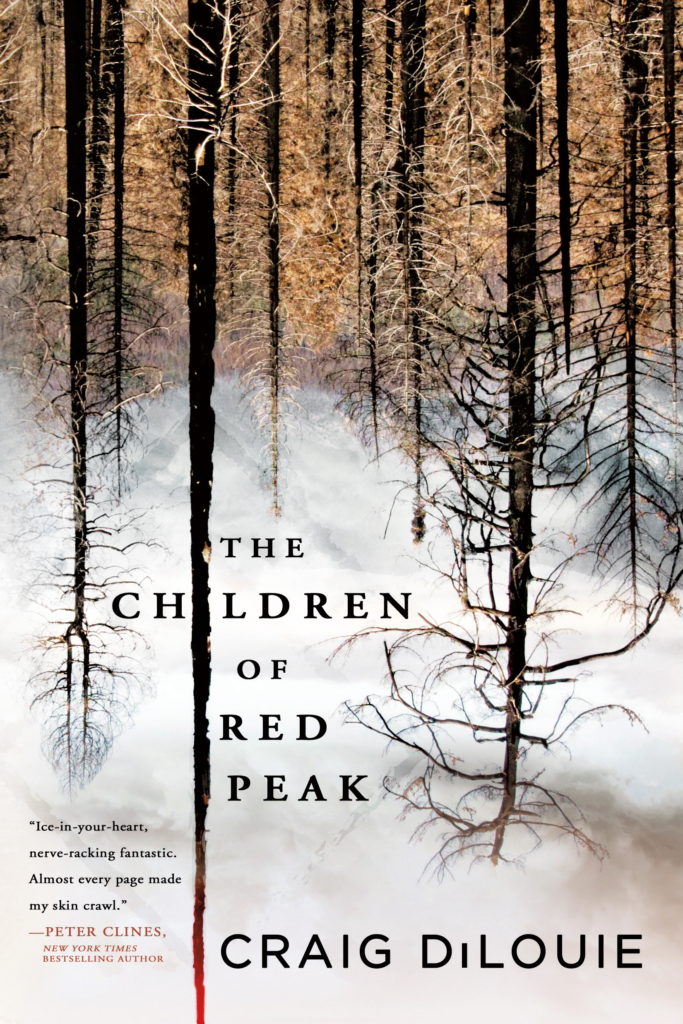Content note: this post, and the book it discusses, addresses suicide, cults, and parental trauma. Please proceed cautiously.
Bram Stoker Award-nominee Craig DiLouie’s newest release takes us into the world of cults, where we ponder the meaning of life, what happens after death, and how trauma changes our lives. The Children of Red Peak follows a group of friends, now adults, who were part of the Family of the Living Spirit cult as children. Each of them has dealt with the trauma of witnessing a mass suicide in their own way, but it’s the suicide of one of their fellow survivors, Emily, that brings them back together after they’d drifted apart to build their lives.
To complicate their trauma (and add intrigue to the novel), no bodies were ever found on the Peak, despite dozens of the Family members dying there, and other religious fanatics dying mysteriously on the Peak in previous decades.
David, who hid during the cult’s mass suicide, has no memory of what actually occured that fateful night. Beth, now a psychologist, suppressed her own memories. Deacon, a singer in a rock band, seems to remember the trauma, but only acknowledges it through the lens of his lyrics. And David’s sister, Angela, is the only one who has accepted the truth of what happened that night, but her abrasive attitude has estranged her from the rest of the group, and their reluctance to face the truth further causes division between the victims.
But the fifteenth anniversary of the mass suicide is coming up, and Emily’s death, along with a note confessing that she “couldn’t fight it anymore,” becomes a catalyst for the group to open their minds and learn what actually happened that night once and for all.

Throughout most of the novel, we’re left wondering whether the cult’s leader, Reverend Peale, was mad, or if he actually heard the voice of God speaking to him… or whether it was another voice entirely. It doesn’t become clear until the end what the answer to the “Medford Mystery,” as fanatics termed the suicide event at Red Peak, really is. The group decides that they can no longer attempt to ignore what happened on the mountain, and for the anniversary, they make a trek to their once childhood home to ascend the peak and find out what’s waiting for them at the top, as well as what happened to the bodies of their loved ones, once and for all.
Red Peak is a poignant novel that examines the darkest corners of trauma, and whether or not the characters are capable of overcoming it in any meaningful way. In the end, it could be argued that they all overcame the haunting events of that night and the truth about Red Peak, but just like manifestations of trauma, closure looks different for them all.
The novel alternates between present day and the months the characters each spent in the cult, both providing great pacing and slowly revealing the truth each of the characters holds deep within them. However, the story is told through multiple characters’ points of view, and it’s not always immediately clear whose point of view we’re reading from at the beginning of each chapter, so the structure is a bit disorienting at times.
Though DiLouie attempts to answer questions about the meaning of life and what happens after we die, there are, of course, no real answers to be had. Watching the characters try to find the answers for themselves, both in the past and the present, illustrates exactly how fleshed out and well-written these characters are. Each has their own answer to those questions, and their individual trauma and subsequent response informs how they perceive the answers to those questions.
Where this novel really shines, however, is in its examination of how each of the members responds to the trauma of being in that cult, and the mysterious events of that last night. Every single character is fully formed, and because the novel jumps from one character’s head to another, we have the opportunity to see how they project themselves in response to their trauma, as well as how they handle those events internally. We see the lies they tell others, the lies they tell themselves, and what each of them is really afraid of.
Overall, DiLouie does an excellent job of turning the typical horror novel on its head. Red Peak is a slow burn, less fast-paced than his other works, yet no less thrilling. Every chapter introduces new questions and peppers in new information, urging us to continue to turn the pages in search of answers. In some ways, this novel defies classification. It’s not quite a thriller, nor suspense, nor horror (if you go with the purist definition of the horrific). At its core, Red Peak is a story of the human condition–a deep analysis of how trauma affects us all differently, and how we have to find individual ways to cope with it. It’s a tale of belief, faith, and religion, and how we find meaning in things we cannot see, touch, taste, or feel. It examines our constant search for purpose in life, and in the moments before our death. And it examines the biological link we have with our parents and offspring, a link that is tested in just the same way Abraham of the Bible was tested when he was ordered to kill his son to prove his faith.
The horror of this novel doesn’t lie in what awaits our survivors at Red Peak–it lies in what lives within each of them, growing year after year, being suppressed and denied until it becomes all-consuming, forcing our heroes to find their reckoning in religion, faith, science, and family. And although the ending could be described as morose, it’s also wildly hopeful, and completely inevitable. Red Peak is an excellent read for anyone who’s been touched by trauma, but DiLouie’s handling of the characters and the care he shows with each one of them is what will live with readers long after they turn the final page.



